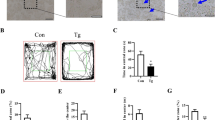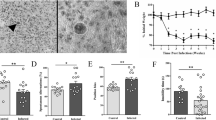Abstract
The aim of the present study was to determine the effects of Toxoplasma gondii (T. gondii) infection on anxiety, depression and ghrelin level in male rats. Twenty four male rats were assessed in two equal groups. T. gondii tachyzoite (ip) were injected in infected group and control group received (2 ml) physiological serum (ip). Elevated plus Maze and swimming tests were used to assess anxiety and depression in rats respectively. The ghrelin and T. gondii IgG serum levels were measured by enzyme immunoassay kits. The Student’s t test and Pearson correlation coefficient were used. The ghrelin serum level was significantly lower in the infected rats than control (P = 0.03). There were no significant differences in the depression and anxiety behavior between two groups. However, here were no significant correlations between ghrelin level and anxiety or depression in rats. It seems that latent T. gondii infection decreases the ghrelin serum level but does not change anxiety and depression like behaviors.


Similar content being viewed by others
References
Arling TA, Yolken RH, Lapidus M, Langenberg P, Dickerson FB, Zimmerman SA et al (2009) Toxoplasma gondii antibody titers and history of suicide attempts in patients with recurrent mood disorders. J Nerv Ment Dis 197(12):905–908
Brown RE, Corey SC, Moore AK (1999) Differences in measures of exploration and fear in MHC-congenic C57BL/6J and B6-H2K mice. Behav Genet 26:263–271
Carlini VP, Monzón ME, Varas MM, Cragnolini AB, Schiöth HB, Scimonelli TN et al (2002) Ghrelin increases anxiety-like behavior and memory retention in rats. Biochem Biophys Res Commun 299(5):739–743
Carlini VP, Varas MM, Cragnolini AB, Schiöth HB, Scimonelli TN, de Barioglio SR (2004) Differential role of the hippocampus, amygdala, and dorsal raphe nucleus in regulating feeding, memory, and anxiety-like behavioral responses to ghrelin. Biochem Biophys Res Commun 313(3):635–641
Carvajal P, Carlini VP, Schiöth HB, de Barioglio SR, Salvatierra NA (2009) Salvatierra, Central ghrelin increases anxiety in the open field test and impairs retention memory in a passive avoidance task in neonatal chicks. Neurobiol Learn Mem 91(4):402–407
Cole JC, Rodgers RJ (1994) Ethological evaluation of the effects of acute and chronic buspirone treatment in the murine elevated plus-maze test: comparison with haloperidol. Psychopharmacology [Berl] 114(2):288–296
Erensoy A, Aydin S, Kelestimur N, Kirbag S, Kuk S (2010) The change of ghrelin levels in intestinal parasitic infections. JMB 29(1):34–38
Flegr J, Zitková S, Kodym P, Frynta D (1996) Induction of changes in human behaviour by the parasitic protozoan Toxoplasma gondii. Parasitology 113(Pt 1):49–54
Gonzalez LE, Rojnik B, Urrea F, Urdaneta H, Petrosino P, Colasante C et al (2007) Toxoplasma gondii infection lower anxiety as measured in the plus-maze and social interaction tests in rats. A behavioral analysis. Behav Brain Res 177(1):70–79 Epub 2006 Dec 12
Groër MW, Yolken RH, Xiao JC, Beckstead JW, Fuchs D, Mohapatra SS et al (2011) Prenatal depression and anxiety in Toxoplasma gondii-positive women. Am J Obstet Gynecol 204(5):433.e1–7
Groër MW, Kruszon-Moran D, Jones JL (2012) The relationship between Toxoplasma gondii infection and mood disorders in the third National Health and Nutrition Survey. Biol Psychiatry 72(4):290–295
Guenter W, Bieliński M, Deptuła A, Zalas-Wiecek P, Piskunowicz M, Szwed K et al (2012) Does Toxoplasma gondii infection affect cognitive function? A case control study. Folia Parasitol (Praha). 2012 Jun; 59(2):93–98. Erratum in: Folia Parasitol (Praha) 59(4):253–254
Gulinello M, Acquarone M, Kim JH, Spray DC, Barbosa HS, Sellers R et al (2010) Acquired infection with Toxoplasma gondii in adult mice results in sensorimotor deficits but normal cognitive behavior despite widespread brain pathology. Microbes Infect 12(7):528–537
Halonen SK, Weiss LM (2013) Toxoplasmosis. Handb Clin Neurol 114:125–145
Hermes G, Ajioka JW, Kelly KA, Mui E, Roberts F, Kasza K et al (2008) Neurological and behavioral abnormalities, ventricular dilatation, altered cellular functions, inflammation, and neuronal injury in brains of mice due to common, persistent, parasitic infection. J Neuroinflammation 5:48
Huffman JC, Celano CM, Januzzi JL (2010) The relationship between depression, anxiety and cardiovascular outcomes in patients with acute coronary syndromes. Neuropsychiatr Dis Treat 6:123–136
Kanehisa M, Akiyoshi J, Kitaichi T, Matsushita H, Tanaka E, Kodama K et al (2006) Administration of antisense DNA for ghrelin causes an antidepressant and anxiolytic response in rats. Prog Neuropsychopharmacol Biol Psychiatry 30(8):1403–1407 Epub 2006 Jun 21
Kannan G, Moldovan K, Xiao JC, Yolken RH, Jones-Brando L, Pletnikov MV (2010) Toxoplasma gondii strain-dependent effects on mouse behaviour. Folia Parasitol [Praha] 57(2):151–155
Kar N, Misra B (2004) Toxoplasma seropositivity and depression: a case report. BMC Psychiatry 4:1
Kojima M, Hosoda H, Date Y, Nakazato M, Matsuo H, Kangawa K (1999) Ghrelin is a growth hormone-releasing acylated peptide from stomach. Nature 402(6762):656–660
Kristensson E, Sundqvist M, Håkanson R, Lindström E (2007) High gastrin cell activity and low ghrelin cell activity in high-anxiety Wistar Kyoto rats. J Endocrinol 193(2):245–250
Kristenssson E, Sundqvist M, Astin M, Kjerling M, Mattsson H, Dornonville de la Cour C et al (2006) Acute psychological stress raises plasma ghrelin in the rat. Regul Pept 134(2–3):114–117
Lao KM, Lim WS, Ng DL, Tengku-Muhammad TS, Choo OC, Chew H (2013) Molecular regulation of ghrelin expression by pro-inflammatory cytokines TNF-α and IL-6 in rat pancreatic AR42J cell line. J Biol Life Sci 4(1):32–40
Lister RG (1990) Ethologically-based animal models of anxiety disorders. Pharmacol Ther 46(3):321–340
Lutter M, Sakata I, Osborne-Lawrence S, Rovinsky SA, Anderson JG, Jung S et al (2008) The orexigenic hormone ghrelin defends against depressive symptoms of chronic stress. Nat Neurosci 11(7):752–753
Matowicka-Karna J, Dymicka-Piekarska V, Kemona H (2009) Does Toxoplasma gondii infection affect the levels of IgE and cytokines [IL-5, IL-6, IL-10, IL- 12, and TNF-alpha]? Clin Dev Immunol 2009:374696
Mortensen PB, Nørgaard-Pedersen B, Waltoft BL, Sørensen TL, Hougaard D, Torrey EF et al (2007) Toxoplasma gondii as a risk factor for early-onset schizophrenia: analysis of filter paper blood samples obtained at birth. Biol Psychiatry 61(5):688–693
Okome-Nkoumou M, Guiyedi V, Ondounda M, Efire N, Clevenbergh P, Dibo M, Dzeing-Ella A (2014) Opportunistic diseases in HIV-Infected patients in Gabon following the administration of highly active antiretroviral therapy: a retrospective study. Am J Trop Med Hyg 90(2):211–215
Pearce BD, Kruszon-Moran D, Jones JL (2012) The relationship between Toxoplasma gondii infection and mood disorders in the third National Health and Nutrition Survey. Biol Psychiatry 72(4):290–295
Shaddel M, Mehbod ASA, Karamy M (2007) Toxoplasma gondii infection in neonates. Iran J Parasitol 2(3):34–37
Shaddel M, Mirzaii-Dizgah I, Hoshangi M (2014) Anti-Toxoplasma gondii antibody levels in blood supply of Shiraz blood transfusion institute, Iran. Iran J Parasitol 9(1):120–124
Tenter AM, Heckeroth AR, Weiss LM (2000) Toxoplasma gondii: from animals to humans. Int J Parasitol 30(12-13):1217–1258
Trullas R, Skolnick P (1993) Differences in fear motivated behaviors among inbred mouse strains. Psychopharmacology [Berl] 111(3):323–331
Vyas A, Kim SK, Giacomini N, Boothroyd JC, Sapolsky RM (2007) Behavioral changes induced by Toxoplasma infection of rodents are highly specific to aversion of cat odors. Proc Natl Acad Sci USA 104(15):6442–6447
Acknowledgments
we are grateful to Dr. Mohammad Reza Ibrahimi Dep. Of Psychology, School of Medicine, AJA University of Medical Sciences, Tehran, Iran for providing Elevated plus maze for anxiety measurement. This research was supported by the research project of AJA University of Medical Sciences (591107).
Author information
Authors and Affiliations
Corresponding author
Rights and permissions
About this article
Cite this article
Parvin, Z., Iraj, M.D., Minoo, S. et al. Effects of Toxoplasma gondii infection on anxiety, depression and ghrelin level in male rats. J Parasit Dis 40, 688–693 (2016). https://doi.org/10.1007/s12639-014-0561-0
Received:
Accepted:
Published:
Issue Date:
DOI: https://doi.org/10.1007/s12639-014-0561-0




